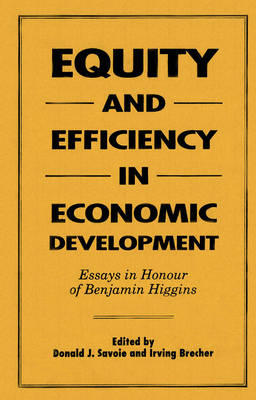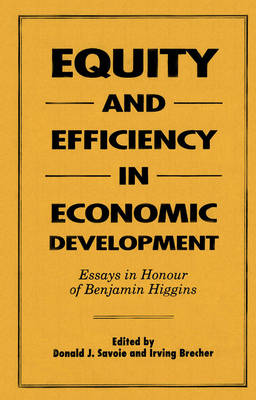
- Afhalen na 1 uur in een winkel met voorraad
- Gratis thuislevering in België vanaf € 30
- Ruim aanbod met 7 miljoen producten
- Afhalen na 1 uur in een winkel met voorraad
- Gratis thuislevering in België vanaf € 30
- Ruim aanbod met 7 miljoen producten
Zoeken
Equity and Efficiency in Economic Development
Essays in Honour of Benjamin Higgins
Irving Brecher, Donald J Savoie
Hardcover | Engels
€ 177,45
+ 354 punten
Omschrijving
The ideological foundations of the contributors range from personalized neo-Marxism, through extreme centre neo-Keynesianism, to hard-line neoclassical mathematical economics. Despite this diversity there is a surprising degree of consensus. No contributor advocates centralized planning and none expects a free market to cure all economic ills. Opinions vary as to how well the market actually works, but all agree that equity and efficiency are essential goals which most consider to be complementary rather than mutually exclusive. In the concluding chapter it is suggested that current economic problems are caused not so much by government intervention as by the nature of that intervention. The authors believe that the recent ideological convergence may lead to a new paradigm, a theory of the optimal blend of market and management that will be flexible enough to deal with the varying conditions of diverse societies, thus simplifying the task of creating a smooth-running global economy. The contributors are Irma Adelman, Mark Blaug, Kenneth Boulding, Irving Brecher, Albert Breton, John S. Chipman, André Gunder Frank, Martha Fuentes Frank, Niles Hansen, Murray C. Kemp, Robin Marris, Richard Musgrave, Walt Rostow, Donald J. Savoie, Nicholas Spulber, and Paul Streeten. Higgins himself contributes a chapter on basic concepts and collaborates with Donald Savoie on the final chapter.
Specificaties
Betrokkenen
- Auteur(s):
- Uitgeverij:
Inhoud
- Aantal bladzijden:
- 448
- Taal:
- Engels
Eigenschappen
- Productcode (EAN):
- 9780773508477
- Verschijningsdatum:
- 16/10/1992
- Uitvoering:
- Hardcover
- Formaat:
- Genaaid
- Afmetingen:
- 157 mm x 235 mm
- Gewicht:
- 748 g

Alleen bij Standaard Boekhandel
+ 354 punten op je klantenkaart van Standaard Boekhandel
Beoordelingen
We publiceren alleen reviews die voldoen aan de voorwaarden voor reviews. Bekijk onze voorwaarden voor reviews.








